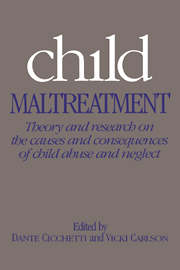Book contents
- Frontmatter
- Contents
- List of contributors
- Preface
- Part I History and definition
- Part II Parental and contextual influences on maltreatment
- 6 Lessons from child abuse: the determinants of parenting
- 7 The antecedents of maltreatment: results of the Mother–Child Interaction Research Project
- 8 Parental attributions as moderators of affective communication to children at risk for physical abuse
- 9 Perceived similarities and disagreements about childrearing practices in abusive and nonabusive families: intergenerational and concurrent family processes
- 10 Cognitive foundations for parental care
- 11 Intergenerational continuities and discontinuities in serious parenting difficulties
- 12 The construct of empathy and the phenomenon of physical maltreatment of children
- Part III The developmental consequences of child maltreatment
- Name index
- Subject index
6 - Lessons from child abuse: the determinants of parenting
Published online by Cambridge University Press: 04 May 2010
- Frontmatter
- Contents
- List of contributors
- Preface
- Part I History and definition
- Part II Parental and contextual influences on maltreatment
- 6 Lessons from child abuse: the determinants of parenting
- 7 The antecedents of maltreatment: results of the Mother–Child Interaction Research Project
- 8 Parental attributions as moderators of affective communication to children at risk for physical abuse
- 9 Perceived similarities and disagreements about childrearing practices in abusive and nonabusive families: intergenerational and concurrent family processes
- 10 Cognitive foundations for parental care
- 11 Intergenerational continuities and discontinuities in serious parenting difficulties
- 12 The construct of empathy and the phenomenon of physical maltreatment of children
- Part III The developmental consequences of child maltreatment
- Name index
- Subject index
Summary
The determinants of parenting: a process model
By tradition, students of socialization have directed their primary energies toward understanding processes whereby parents’ child rearing strategies and behaviors shape and influence their off-springs’ development. Whereas great effort has been expended studying the characteristics and consequences of parenting, much less attention has been devoted to studying why parents parent the way they do – beyond, of course, social-class and cross-cultural comparisons (e.g., Hess and Shipman, 1965; Lewis and Wilson, 1972; Whiting and Whiting, 1975), and investigations examining the effect of the child on parenting behavior (e.g., Bell, 1968; Lewis and Rosenblum, 1974). This is not to say, however, that no data have been collected on this topic beyond the general areas of inquiry just outlined. In point of fact, it is suprising to learn that, despite the relative neglect of the study of the determinants of parenting, a large quantity of empirical information is available that addresses this general issue.
It is unfortunately the case that much of the research relevant to this area of concern remains unintegrated and underutilized. One reason for this is that many of the research findings pertinent to the study of parental determinants are found in a diverse set of studies that have little to do with each other beyond some secondary result or focus that speaks to this issue. But probably the major reason studies pertinent to the determinants of parenting remain unrelated is, in part, the general absence of conceptual models capable of integrating the disparate findings in the literature into a coherent whole.
- Type
- Chapter
- Information
- Child MaltreatmentTheory and Research on the Causes and Consequences of Child Abuse and Neglect, pp. 153 - 202Publisher: Cambridge University PressPrint publication year: 1989
- 122
- Cited by



